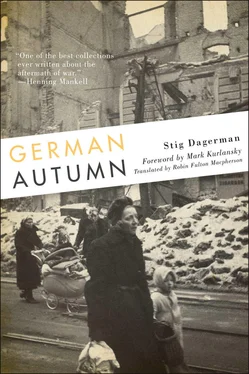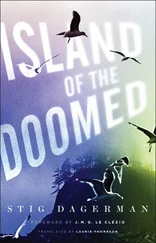Stig Dagerman
German Autumn
FOREWORD. Pitiless Fall by MARK KURLANSKY
Doomed be the fatherland, false name,
Where nothing thrives but disgrace and shame
— Heinrich Heine, Germany: A Winter’s Tale (1844)
There is a place I like to go on the Upper East Side of Manhattan. It is the Neue Galerie, a museum specializing in the art of Germany and Austria, much of it from what was a kind of golden age during the first part of the twentieth century. A gift shop features Austro-German design from the early twentieth century, and the bookstore sells German literature in German and translated into English (Goethe, Heine, Mann, and the great thinkers — Freud, Hegel, Spengler, Kant, Nietzsche, Marx, Jaspers), as well as books about the artists and the great expressionist filmmakers who influenced directors such as Alfred Hitchcock. Then I sit in the café, where they serve Riesling wine in little carafes (fruity but not the cheap postwar sugared variety) and spätzle and sausage and light crispy apfelstrudel with an imposing cloud of whipped cream, all consumed while listening to Mozart with some well-dressed older people at other tables whispering in the wonderfully expressive German language — a language that seems designed for expanding ideas. I sit there and think, this is what it would be like, this is how we would think of Germany, if Adolf Hitler had not come to power.
American schoolchildren used to study German. It was the leading second language before Hitler came to power. Even after World War I, my parents, Jewish kids, studied German in school. Germany was one of the great centers of European culture. But Hitler did come to power, and we have never thought of Germany the same way since.
A number of notable German intellectuals predicted that out of the richness of German thought would come an arrogance that would destroy Germany. In 1834 the poet Heinrich Heine wrote, “German thunder is of true Germanic character; it is not very nimble, but rumbles along ponderously. Yet, it will come and when you hear a crashing such as never before has been heard in the world’s history, then you know that the German thunderbolt has fallen at last. At that uproar the eagles of the air will drop dead, and lions in the remotest deserts of Africa will hide in their royal dens. A play will be performed in Germany that will make the French Revolution look like an innocent idyll.”
In 1889, Nietzsche wrote, “I know my fate. One day there will be associated with my name the recollection of something frightful — of a crisis like no other before on earth.” The crisis came and was associated with his name though most historians believe that Hitler’s claim even to have read Nietzsche was a lie.
In his novel The Magic Mountain (1924), Thomas Mann wrote, “Passion means to live life for life’s sake. But I am well aware you Germans live it for the sake of experience. Passion means to forget oneself. But you do things in order to enrich yourselves. C’est ça. You haven’t the least notion how repulsively egoistic that is of you and that someday it may well make you the enemy of humankind.”
By 1945 Hitler was dead and Germany was physically, morally, psychologically, and spiritually in ruins. Not only was the German claim to civilization gone, but most of the world did regard Germans as “the enemy of humankind” and unworthy of even basic human compassion.
In 1946 Thomas Mann, then considered Germany’s greatest modern writer and an opponent of the regime, stated that even the German language had lost credibility: “To be a German author — what will that be? Back of every sentence that we construct in our language stands a broken, a spiritually burnt-out people, bewildered about itself and its history, a people that, according to reports, despairs of ever governing itself.” Mann called Germans “a people that can never show its face again.”
That same year, in the autumn of 1946, Stig Dagerman, Wunderkind of Swedish letters at the age of twenty-three, was sent to Germany by the Swedish newspaper Expressen. Dagerman was a too-bright filament that burned out quickly. He had already written two novels and been proclaimed in Sweden as the premier genius of a new generation. The year after he wrote German Autumn he would publish a collection of short stories and his first play was produced in Stockholm to dazzling success. The next year he wrote two more plays and a third novel. The next year he came out with a fourth novel and wrote a fourth play. Except for this last play, which the author himself disliked, all of these works, including German Autumn, were widely regarded as brilliant.
But then he couldn’t write anymore.
Dagerman was twenty-six and used up. He undertook projects, he kept trying, but he could not write. In 1954, age thirty-one, he gassed himself to death in his car parked in his garage. Recent research suggests he may have been suffering from clinical depression or bipolar disorder with possible manic episodes.
Dagerman’s extraordinary gift was his ability to empathize. He came from a poor rural background; his grandparents raise him because he was abandoned by his parents. A deranged man stabbed his grandfather to death, and his grandmother died soon after from the shock. When Dagerman heard of the murder he tried to write a poem about his feelings. He couldn’t do it, but he regarded that experience as his beginning as a writer. “Something was born,” he wrote. “Something that I believe was the desire to be a writer; that is to say, to be able to tell of what it is to mourn, to have been loved, to be left lonely …” He said his grandmother had “the courage to show love.” Stig Dagerman had the courage to show compassion, and in Germany in 1946 that required a considerable amount of courage.
The Allied bombing of Germany and Japan during World War II demonstrated the classic example of the old argument of war resisters that if you go to war you start to resemble your enemy.
Until the beginning of the Allied campaigns the overwhelming opinion in the nations that were carrying out this bombing (principally Britain and the United States, but also world opinion in general) was that dropping explosives on a civilian population from airplanes was a heinous crime. On April 26, 1937, German and Italian planes firebombed Guernica, the historic capital of Basque country in northern Spain. The world was outraged by this new form of warfare, random attacks on civilian populations from the air. The raid was seen as proof of the brutality of fascism.
Then, with little protest, these same outraged nations conducted a bombing campaign that killed an estimated 300,000 German civilians and wounded more than 800,000 Germans. This is a modest estimate; in Europe and Asia combined, Allied bombing is thought to have killed at least 800,000 people. The question is whether it is morally relevant to point out that although German bombing killed only a fraction of this total, the Germans did kill millions of civilians, including the six million systematically exterminated in specifically designed death camps. So how can we feel sorry for them?
But what had happened to the values of the people who had been outraged about Guernica? The problem was once explained by President Dwight D. Eisenhower, the former Allied commander who declared in a press conference in 1955 that once you get into a war you get “deeper and deeper” until the only obstacles are the limitations of “force itself.”
As is pointed out in an almost childlike way, the Germans started it. They started it not only in Durango and Guernica during the Spanish Civil War but with their nearly twelve-hour bombing on November 15, 1940, of the historic English city of Coventry, in which six hundred civilians, the center of the city, and a famous fourteenth-century cathedral were destroyed. The Germans issued a statement that this occurred in reprisal for British RAF raids on German cities, which had been ongoing since May.
Читать дальше












